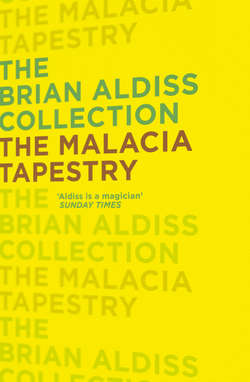Читать книгу The Malacia Tapestry - Brian Aldiss - Страница 10
A Balloon over the Bucintoro
ОглавлениеWhen you take a stroll through our city along the banks of the River Toi, and especially along the elegant Bucintoro, where pavements are of gold, you can look north and regard verdant expanses of countryside stretching into the Vokoban Mountains, which are themselves, at least on their southern slopes, green and well-favoured.
When from any other vantage point in Malacia you gaze towards the country, you see nothing so enticing. True, there is the long, dusty road to Byzantium, while to the south-east lies the Vamonal Canal, tree-fringed for most of its course; but in general the vistas consist of undulating plain – ochre, sullen, primitive; all those things against which the idea of Malacia is most opposed. To the west lie the no less uninviting Prilipit Mountains, where the terrain is distorted and uncouth.
Among the folds of the Prilipits, even as Armida and I were luxuriously plighting our troth, gathered an Ottoman army intent upon laying waste Malacia.
There was a general alarm and mustering of arms. Not a citizen but feared for his well-being, his wife, or something he held dear. But such armies had gathered beyond our fortifications before, had been defeated, and had retired in disarray.
The Council and the general did what they deemed necessary. They paraded our own forces, they polished our cannon-balls, they set the blue and black flag of Malacia flying from every battlement, they drew a barrage across the rivers, they increased the price of fish and flour in the markets.
While these high strategies were in process, groups of citizens climbed to vantage points in the city – up rickety staircases to belfries – to espy the gaudy tents of the foe; but most of us saw it as our duty to continue living as usual, whilst paying more for loaves and sprats.
Some there were, of course, who fled the city, going by barge to Vamonal or by foot or litter to Byzantium. Others bolted themselves in houses or cellars. For myself, I feared nothing; Armida had cast a spell over my life.
All know what it is to be in love. When I opened my casement window and the breeze wafted down from a meadow outside the city, that breeze might have touched her cheek on its way to me; when I trod the street, the ground beneath my feet led somewhere to her, was trodden by her feet; when I glanced up and happened to see a bird flying in the sky, it might be that she saw it at the same instant, so that our gazes interlocked. Whenever I touched an object, it reminded me of touching her; when I ate, the action made me recall that she ate; when I spoke to anyone, I recalled what it felt like to speak to her; when I kept silent, it put me in mind of her lips, unspeaking. The world became a conspiracy of her.
In the circumstances, the Ottomans could not weigh down my heart or my considerations by a denario’s worth.
One evening, when a Turkish spy was caught in the main square and had his neck extended by a good half-metre before Fetter Place, I went with de Lambant to visit Otto Bengtsohn and inquire how the mercurisation was progressing. Such was his secretiveness that, as yet, he had shown nobody his results.
‘How appropriate that you should be immortalised on glass.’ said de Lambant. ‘You are such a transparent character, my friend.’
I had paid for the wine that evening. ‘Then we must see that you are posted to posterity on skin and flint,’ I said.
We went in through the court by the sign of the Dark Eye and into the workshop, where Bonihatch and other assistants were still at work, or bowed over their painting desks pretending to work. Slapping the erstwhile Prince Mendicula on his back, I led the way into the gallery which at this hour was closed to the public.
